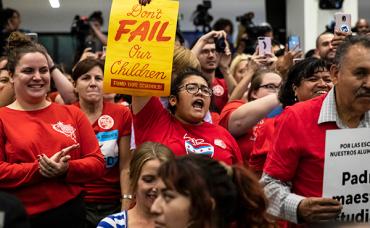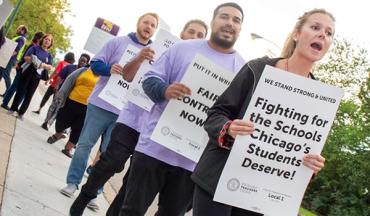On Sept. 26, the Chicago Teachers Union announced that 94 percent of its members voted to go on strike. They could walk off the job and onto the picket lines on Thursday, Oct. 17.
In addition to issues of wages, benefits, evaluation, and preparation time, CTU members have been pressing the city to address student needs. Current law prevents them from striking over such issues, but there is room to change the law, and the issues are so urgent they have become a big part of the conversation.
“The [strike] vote stands as a mandate from CTU members for Chicago Public Schools to uphold promises of equity and educational justice made by Mayor Lori Lightfoot, and that those promises must be in writing in an enforceable contract,” reads a CTU press release. Lightfoot, who was elected in April, promised during her campaign to address school inequities and has said—but not yet acted on her promise—that she will put school services into the city budget. CTU is asking for a written commitment from the mayor to provide enough staff for the school district, including a nurse, a teacher librarian and a social worker in every school. CTU members have flooded the internet with the hashtag #PutItInWriting, insisting that a legal union contract is the only way to ensure their students get the resources and attention they deserve.
“Our school communities are desperately short of nurses, social workers, psychologists, counselors and other support staff, even as our students struggle with high levels of trauma driven by poverty and neighborhood violence,” says CTU President Jesse Sharkey. A labor contract covering these services is “the only way to hold the district to its word after decades of austerity, budget cuts, understaffing, school closings and privatization,” CTU says.
The union has broad support from parents, families, community members and even influential politicians: Five of the nation’s Democratic presidential candidates—Joe Biden, Julián Castro, Kamala Harris, Bernie Sanders and Elizabeth Warren—have expressed solidarity with CTU, and on Sept. 24 Sanders joined rank-and-file members at a packed rally to support union demands.
“Sign a contract that deals with the desperate shortage of school nurses, of social workers, of librarians and of other critical staff that keep our schools going,” he urged the Chicago school board. “When we talk about valuing work, it’s not the hedge fund managers on Wall Street that we should value. It’s the teachers of this country; it’s the staff; it’s the school nurses and the librarians.”
CTU’s top demands include a higher wage floor for school clerks, teaching assistants and other paraprofessionals—many of whom earn wages so low their children qualify for free and reduced-price school lunches; lower class sizes—to prevent the current practice of packing some kindergarten classes with more than 40 students each; increased numbers of school nurses, social workers and other critical frontline staff; protections for special education students and English language learners; and a greater investment in CPS resources—which have grown by more than $1 billion a year—into classroom needs and student supports.
The school board has proposed a contract with a 16 percent teacher raise over five years, minus health insurance increases. CTU members say the city is trying to buy their loyalty, but they won’t abandon their commitment to school improvements.
“I refuse to say ‘yes’ to a deal that benefits me personally when the majority of South and West Side schools have no library or librarian,” wrote Leslie Westerberg, a teacher and librarian at Nixon Elementary School, in a letter to Chicago Tribune editors. “I will not sign any deal that continues to force educators to teach classes of 40-plus students, when research proves this is harmful to students.
“The ‘greedy teacher’ narrative has gotten quite stale in recent weeks. We want what’s best for our students—adequate staffing, clean schools, lower class sizes and time to plan. If that makes me greedy, then so be it.”
CTU includes teachers, clinicians, paraprofessionals and support personnel, nurses and librarians. Additional support workers—members of the Service Employees International Union, Local 73, who are special education classroom assistants, bus aides, security guards and custodians—have also voted to strike, and the two unions are standing in solidarity.
[Virginia Myers, CTU staff]


